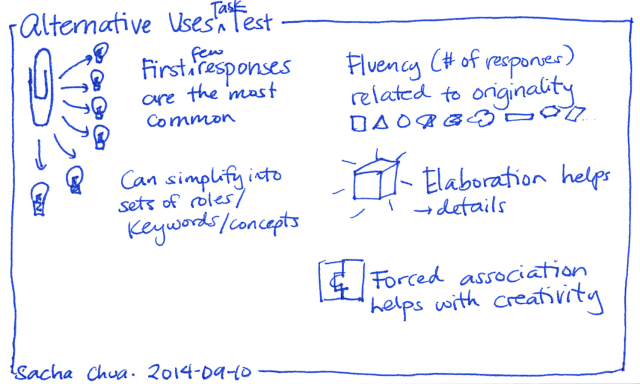Learning from the Alternative Uses Task
Posted: - Modified: | learningThere's a creativity test called the Alternative Uses Task, where you're asked to come up with as many different uses as you can for an everyday object (for example, a paperclip or a brick). I was thinking about it recently because I was curious about programming and creativity, and how my clients sometimes tell me, “I had no idea XYZ could be used for that!” (Javascript, AutoHotkey, etc.). I like coming up with alternative uses when programming, and for things in general. I was wondering how I could get even better at divergent thinking based on what I can learn from the research into it.
From “Evaluating the Alternative Uses Test of Creativity” (Caitlin Dippo, National Conference on Undegraduate Research, 2013), I learned that while the first few responses tend to be pretty common, the more responses you make, the more you tend to come up with original ones. “Divergent thinking: strategies for generating alternative uses for familiar objects” (Gilhooly et. al, 2007) identified a number of strategies that people used when coming up with ideas: memory, property use (breaking it down into properties), broad use (looking at broad categories), and disassembly use (considering its parts). I also remembered the forced association tips from various creativity games – when you try to relate two different ideas together, your brain's pretty good at filling in the gaps.
How can I use that to be more creative? Well, coming up with more answers helps – especially more different ones, not just variations on a theme. Elaborating on ideas and smooshing them together is fun, so I wonder how I can incorporate that kind of play into my learning – maybe through drawing, or brainstorming alternative uses for the tools and tech I have?
Hmm…


